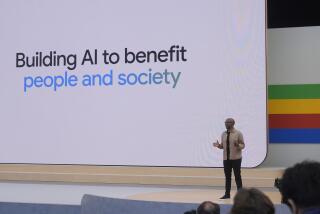Gmail users use less energy than Yahoo mail users, study says
- Share via
What does your email address say about your energy consumption? According to energy efficiency software company Opower, it could say a lot.
The company’s resident number crunchers say that Yahoo! Mail users spend about $110 more a year on energy in their households than Gmail users do. And Opower is quick to point out that the extra kilowatt hours expended by these profligate Yahoo users in a year could power the island of Barbados.
Data came from households across the country, and controlled for differences in climate, according to Barry Fischer, a writer and analyst at Opower. And even though Yahoo users tend to have larger residences, Fischer said the numbers indicate that they still use more energy per square foot in their homes.
But a closer look at the beautifully designed blog post reveals a lot about Opower’s reasons for releasing this viral-ready data on its new blog, Outliers.
Opower sells software to utility companies that evaluates consumers’ energy efficiency. As a result, the tech start-up has access to the email addresses and energy stats of tens of millions of energy users worldwide. Consumers can also use the software to evaluate their own energy use via a Facebook app and other services.
So check out the other conclusions Opower cites about your email address: Gmail users are younger and less likely to be married, and therefore out of the house more. Gmail users also live in more urban areas and share apartments with other people. They have better credit, are hotter dates, are better traveled, and maybe even have better taste in snacks, the blog post goes on. You might be feeling like an old fuddy-duddy right now if your email ends in yahoo.com.
Oh, and what’s this? “Gmail users are 30% more likely than Yahoo users to sign up for an in-depth online analysis of how they can reduce their energy usage,” the report says.
So if you want to prove you’re just as smart as those sexy, sophisticated, urban Gmail kids, maybe you should find out if your utility company works with Opower to give you tips on conserving energy! Well, the blog doesn’t exhort readers to do just that, but you get the idea.
The release somewhat reminded us of a past “study,” released by a company called Aptiquant. It said that Internet Explorer users were not as smart as Web surfers who used other browsers. The person who distributed the press release internationally later admitted that the numbers and Aptiquant were both fake.
Opower says their numbers are real – they’re funded by Silicon Valley venture capital firms and according to a 2011 report on the PG&E website, they deliver a “personalized behavior-based energy efficiency program to 10 million residential customers this year through mail, email, websites, smart phone applications, and text messages.”
Fischer said that Opower, which just launched the Outliers blog as an outlet to crunch and interpret the company’s vast data set, wasn’t “looking to call people out. We’re just looking to shed some light on how different people use different levels of electricity.”
For the first Outliers blog post, the company wanted to use its raw numbers to engage consumers. “There’s been a sense that Gmail subscribers are early adopters of technology,” Fischer said. “We wanted to see if we had observed data on that.”
Apparently they did, but it remains to be seen whether Yahoo users will be glad to hear about it.
ALSO:
Are your kids at risk on social media?
Pinterest grew more than 4,000% in one year
Apple cofounder Steve Wozniak isn’t a fan of ‘poo-poo’ Siri
More to Read
Inside the business of entertainment
The Wide Shot brings you news, analysis and insights on everything from streaming wars to production — and what it all means for the future.
You may occasionally receive promotional content from the Los Angeles Times.









